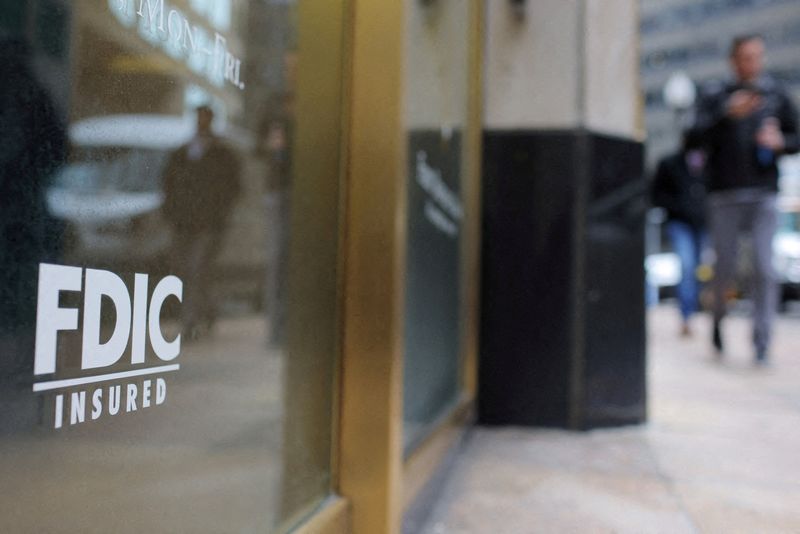By Hannah Lang
(Reuters) - The Federal Deposit Insurance Corp (FDIC) and its flagship deposit insurance fund have been active since the Great Depression to provide an orderly resolution for failed banks and to reimburse certain customer accounts.
The FDIC said on Monday it would backstop a deal for regional lender First Citizens BancShares to acquire failed Silicon Valley Bank, triggering an estimated $20 billion hit to a the deposit insurance fund.
Here's what you need to know about the fund and how it works:
WHAT IS THE DEPOSIT INSURANCE FUND?
The FDIC's deposit insurance fund helps to fulfill the agency's guarantee of bank deposits up to $250,000. In the event an insured bank fails, the FDIC uses the deposit insurance fund to pay back customers who maintained accounts under the limit.
In the case of Silicon Valley Bank and Signature Bank (NASDAQ:SBNY) - which also failed shortly after the collapse of the former - the U.S. government determined that a "systemic risk exception" applied and reimbursed all customers-- including those whose deposits exceeded the $250,000 limit-- in an attempt to prevent further contagion to the banking system.
Throughout the FDIC's history, the insured deposit amount has been raised multiple times, most recently in the wake of the 2008 financial crisis when lawmakers passed legislation raising the cap from $100,000 to $250,000.
HOW IS IT FUNDED?
The deposit insurance fund is funded through fees the FDIC charges insured banks, as well as the interest the FDIC earns on its investment of those funds in U.S. government obligations, like Treasury bills.
The fee a bank pays to the FDIC on a quarterly basis varies depending on a bank's liabilities and its risk profile. As of the end of last year, the deposit insurance fund balance stood at $128.2 billion.
In October, the FDIC finalized a rule to increase initial base deposit insurance assessment rate schedules by 2% starting in June.
The FDIC by law is required to resolve failed banks using the least costly option to minimize losses to its deposit insurance fund.
WHAT HAPPENS WHEN THERE ARE LOSSES TO THE FUND?
In the cases of Silicon Valley Bank and Signature Bank, any losses to the deposit insurance fund will be covered through a "special assessment" fee on banks, according to the FDIC.
The FDIC said on Sunday that it estimates the failure of Silicon Valley Bank will cost the deposit insurance fund $20 billion, but that the exact cost will be determined at a later date.
WHAT IS LOSS SHARING?
The FDIC has the option to enter into a loss-sharing agreement with a firm that purchases a failed bank's assets. Under such an agreement, the FDIC absorbs a portion of the loss on a certain pool of assets, effectively sharing the loss along with the purchaser of a failed bank. The agency occasionally uses this tool to facilitate the sale of a failed bank by helping the acquirer avoid heavier losses.
The FDIC and First Citizens entered into a loss-sharing agreement on the commercial loans First Citizens purchased from Silicon Valley Bank.
If First Citizens makes any recoveries on those commercial loans, the FDIC will receive a portion of those recoveries.
WHAT ELSE WILL THE FDIC GET OUT OF THE FIRST CITIZENS DEAL?

In its announcement on Sunday that First Citizens would purchase Silicon Valley Bank's deposits and loans, the FDIC announced that as part of the deal, it would be receiving equity appreciation rights in First Citizens worth up to $500 million.
Beyond that, the FDIC will receive 3.5% annual interest on a 5-year $35 billion note that First Citizens issued to the FDIC as financing to buy the assets from the FDIC.